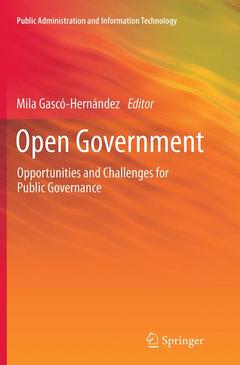Description
Open Government, Softcover reprint of the original 1st ed. 2014
Opportunities and Challenges for Public Governance
Public Administration and Information Technology Series, Vol. 4
Coordinator: Gascó-Hernández Mila
Language: English
Subject for Open Government:
Publication date: 09-2016
Support: Print on demand
Publication date: 02-2014
216 p. · 15.5x23.5 cm · Hardback
Description
/li>Contents
/li>Comment
/li>
Provides insightful analysis about those factors that are critical when designing, implementing and evaluating open government initiatives
Discusses how contextual factors affect open government initiatives’ success or failure
Explores the existence of theoretical models of open government Proposes strategies to move forward and to address future challenges in an international context
Includes supplementary material: sn.pub/extras




